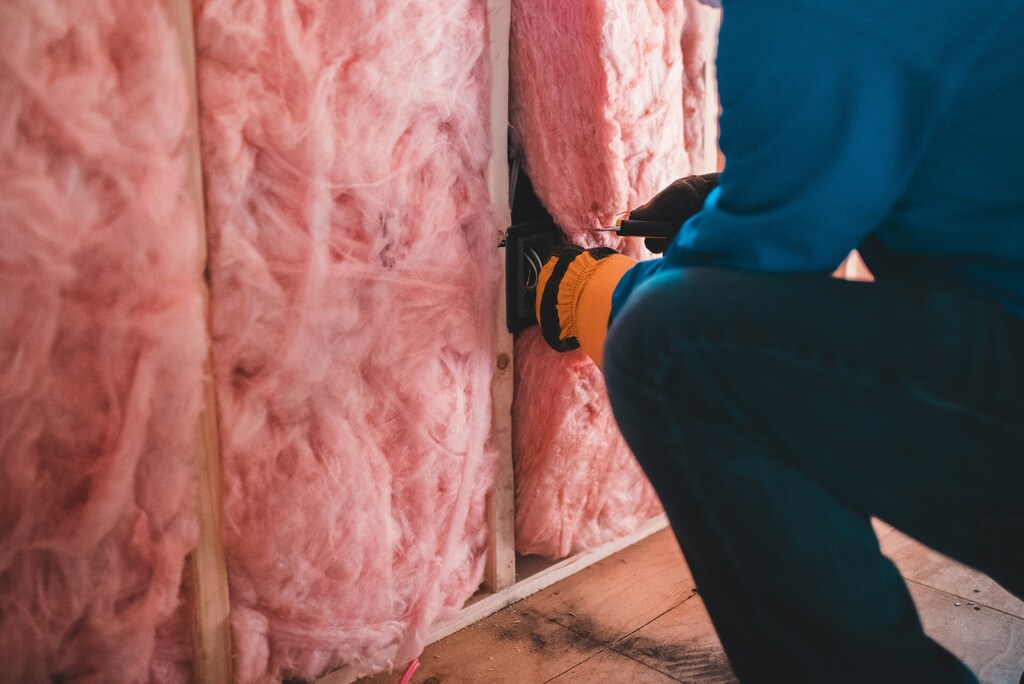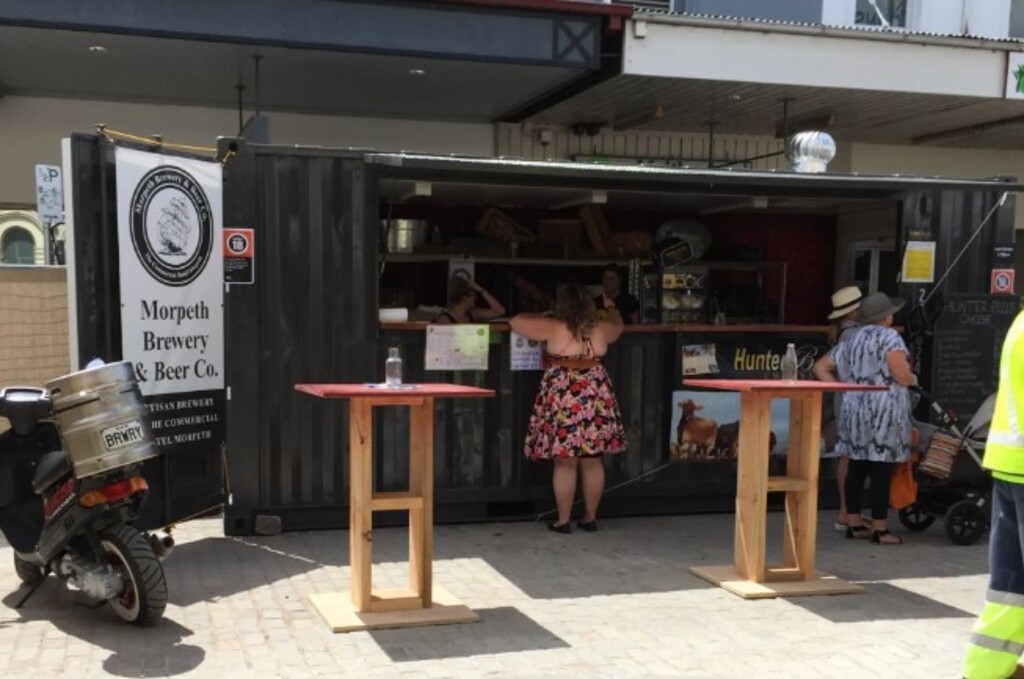Creating a Shipping Container Shop is a smart, sustainable, and often cost-effective way to build a unique commercial space.
It is durable & Secure, as it was made from steel construction that is naturally strong.
However, without insulation, it is prone to heat. You need to upgrade by adding insulation to the unit to make customers want to spend a lot of time in your container shop.
Insulating a shipping container shop is crucial for temperature control, condensation prevention, soundproofing, and overall comfort.
Read this article to find out the key insulation options, considerations, and steps!
Contents
Best Insulation Options for a Shipping Container Shop

1. Spray Foam Insulation
The spray foam insulation is best for the all-around performance (R-value, air seal, moisture barrier).
This insulation type can seal cracks and gaps, and can act as a vapor barrier, which is great for steel containers.
However, it is more expensive upfront and requires professional installation.
2. Rigid Foam Board (Polyiso, EPS, XPS)
Rigid foam board is the type of insulation that is great for DIY builds, interior, or exterior applications.
It offers a good R-value, is easy to cut, simple to install, and can be combined with other materials.
One thing that is not so convenient about the rigid foam board is that it does not air-seal on its own. You will need tape/sealant and furring strips to finish.
3. Mineral Wool / Rockwool
Using Mineral Wool (Rockwool) to insulate a shipping container shop is a solid option, especially if you’re looking for fire resistance, soundproofing, and water resistance.
Unfortunately, it has a lower R-value than spray foam and can not act as an air or vapor barrier must be paired with one.
4. Fiberglass Batt Insulation
Using fiberglass batt insulation in a shipping container shop can be a cost-effective choice. Fiberglass batts are pre-cut panels of spun glass fibers, available in rolls or batts.
They’re commonly used in traditional stick-framed construction and can also work in container shops with proper framing and moisture control.
However, because shipping containers are made of steel (which sweats), you must install fiberglass correctly to prevent moisture and mold issues.
Step-by-Step to Insulate a Shipping Container Shop

1. Prepare the Container Interior
After choosing the insulation type you would want to use, prepare the container interior.
First, clean the surface by removing the dust, grease, and rust. Then, treat rust by using a rust converter or primer.
After that, seal the gaps around doors, windows, and any cutouts using spray foam, caulk, or steel tape.
3. Frame the Interior (if needed)
Framing the interior is only needed when you are using insulation types other than spray foam.
In this step, you need to use wood studs (2×3 or 2×4) or metal studs to frame walls and ceiling to create cavities for rigid board or batt insulation.
Then, attach plywood strips or unistrut to metal walls if needed for anchoring studs.
4. Install Insulation
If you choose to use the spray foam, protect any areas you don’t want sprayed. Apply the spray foam in 2-3 layers on the container walls and ceiling. Then, let each layer cure per the manufacturer’s instructions.
In a condition where you prefer the rigid foam boards for their DIY-friendly feature, cut boards to fit between framing or directly onto steel walls. Then, adhere to steel using foam-safe adhesive and seal gaps with spray foam or tape (important for air-tightness). After that, add furring strips or framing, then finish the walls.
Meanwhile, if you use rockwool or fiberglass batts, install them between studs, then staple them in place. After that, cover with a vapor barrier and finish walls with plywood, drywall, etc.
5. Floor Insulation
Insulating the floor of a shipping container shop is often overlooked, but it is just as important as insulating the walls and ceiling.
Steel floors conduct heat and cold, making the floor very hot in summer and freezing in winter.
Insulating helps keep indoor temperatures stable, reducing strain on HVAC systems.
For container floor insulation, lay 1.5-2″ rigid foam board, and cover with plywood subfloor.
6. Ceiling Insulation
Insulating the ceiling of a shipping container shop is critical. It is because heat rises, and the metal roof of a container absorbs, transfers, and radiates heat and cold very quickly.
Apply spray foam directly or use foam boards between furring strips; make sure to seal completely to avoid hot air pooling at the top. Then, leave space for wiring and lighting fixtures.
7. Finish the Interior
Last, finish the interior by installing a wall cover, such as plywood, OSB, or drywall. Consider moisture-resistant materials if in humid environments. Then, paint or decorate as you desire.
Recommendations
Here are some models of the types of container shops available from Tradecorp, one of the trusted container providers:
Pop-up Container Shop
We have the Pop-Up Container Shop with a sleek design and robust construction that features a customizable interior that can be tailored to suit your business needs.
It comes equipped with a lockable servery window, a fold-down window, and ample space for product displays or food preparation stations.
Whether you’re setting up at a weekend market or a week-long festival, this container shop allows you to adapt quickly to changing opportunities with its mobility.
This shop can be transported to different venues using standard shipping methods. Its durable steel construction ensures it can withstand the rigors of frequent moves while maintaining its structural integrity.
Starter Container Shop
The Starter Container Shop is a practical and efficient solution for entrepreneurs who want to start a business, such as a container bar, retail store, or cafe, with a flexible and ready-to-use design.
It comes in two options with a servery window equipped with a locking awning and gas struts for easy operation.
The flexibility of design and ease of movement make it ideal for a variety of locations, making it the right choice for anyone looking to utilize space effectively and reach a wider market.
Built from a new 20’ shipping container, this portable unit provides enough space to operate in areas with limited space.
Cart Container Coffee Shop
The Cart Container Coffee Shop is a game-changer for mobile beverage businesses.
This innovative unit transforms a standard shipping container into a fully functional, easily transportable coffee shop, reminiscent of your favorite food and beverage wagons.
Designed for maximum convenience and minimal setup, the Cart Container lets you bring your coffee creations directly to your customers, whether at bustling street corners, lively events, or scenic outdoor locations.
Shipping Container Supermarket
Shipping Container Supermarkets excel in mobility and sustainability, allowing businesses to relocate and adapt to changing market demands.
It is perfect for urban areas, rural communities, or temporary event locations.
The container supermarket is made from prefabricated construction to minimize on-site disruption, significantly reducing build times compared to traditional methods.
Display Container
Unlike the container shops that you can use to sell, the Display Container is commonly used just to showcase your products.
This container is an innovative solution for unique and functional exhibition spaces. Its design allows layout and facility adjustments to suit your concept.
Tradecorp provides display containers in 20’ and 40’ sizes, and it is customizable to suit your business needs.
It offers high portability as it is easy to relocate to various locations, and its standard dimensions meet international shipping specifications, enabling transport via trucks, ships, or trains.
Conclusion
Proper insulation transforms a hot, stuffy metal box into a comfortable, breathable shop space.
To get a shop container to start your business, buy or rent from Tradecorp! With years of experience, Tradecorp is a reliable provider of sales, purchase, rental, and modification services.
Tradecorp also provides various types of containers, with a variety of sizes of 20’ or 40’ for cargo shipping, refrigerated, to modular containers.
Consult your modification needs according to your wishes and get the best container sales and rental price offers from Tradecorp by filling out this quote form!


